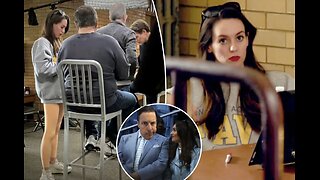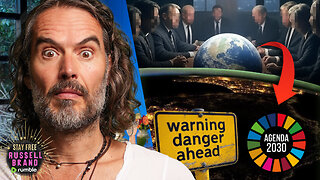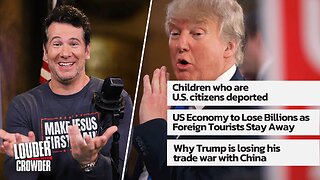Premium Only Content

Episode 2616: Vote like a Catholic: Part 3: The Non-Negotiables of Catholic Social Teaching
Vote like a Catholic: "The Non-Negotiables of Catholic Social Teaching"
Opening Prayer (Led by Sharon):
Heavenly Father, we come before You, seeking Your wisdom and guidance as we discuss the truths of Catholic social teaching. Give us the courage to stand firm in what is right and true, even when it is unpopular. May our hearts be open to Your will, and may our words inspire others to live faithfully according to Your commands. Through the intercession of the Blessed Virgin Mary and all the saints, we ask this in Jesus' name. Amen.
________________________________________
Segment 1: Introduction to Non-Negotiable Principles
Sharon:
Welcome back to our podcast! Today, Walt and I will explore an essential chapter in Catholic social teaching: the non-negotiables. These are fundamental moral issues that are always and everywhere binding for Catholics, regardless of popular opinion. St. Augustine’s words remind us, "Right is right even if no one is doing it; wrong is wrong even if everyone is doing it."
Walt, these non-negotiables abortion, euthanasia, same-sex marriage, and religious freedom are not just political opinions but divine truths rooted in natural law. Catholics have a duty to uphold these truths, no matter how difficult.
________________________________________
Segment 2: Breaking Down the Non-Negotiables
Walt:
Exactly, Sharon. And these issues are non-negotiable because they involve intrinsic evils acts that are always gravely immoral. Let’s start with abortion, the preeminent issue for Catholic voters.
The Catechism teaches that “Human life must be respected and protected absolutely from the moment of conception” (CCC 2270). Pope John Paul II emphasized this in Evangelium Vitae, saying:
"The inalienable right to life of every innocent human individual is a constitutive element of a civil society and its legislation."
No economic policy or social program can justify the killing of an innocent child.
________________________________________
Sharon:
That’s right. And the same applies to euthanasia, which many frame as an act of mercy. But the Church calls this a "false mercy." As Pope John Paul II reminds us, compassion for the suffering doesn’t mean we end their lives. Instead, we are called to accompany them in love.
The sanctity of life extends even into old age or sickness. In Evangelium Vitae, he warns:
"Euthanasia is a grave violation of the law of God, since it is the deliberate and morally unacceptable killing of a human person."
________________________________________
Walt:
Now, let’s look at same-sex marriage. The Church teaches that marriage is a sacred covenant between one man and one woman, ordered toward the procreation and education of children. As Pope Leo XIII said in Arcanum:
"Marriage was established by God to carry out His loving plan in humanity."
While we respect the dignity of every person, Catholics cannot endorse laws that distort God’s design for marriage.
________________________________________
Sharon:
And finally, religious freedom is essential for Catholics to live out their faith. In Dignitatis Humanae, the Church teaches that “the right to religious freedom is based on the very dignity of the human person as known through the revealed word of God.” This freedom allows us not only to worship but to operate schools, businesses, and charities according to Catholic principles.
________________________________________
Segment 3: Why These Issues Take Priority
Walt:
It’s crucial to understand that while many political issues are important, not all have the same moral weight. As Pope Benedict XVI explained:
"Not all moral issues have the same moral weight as abortion and euthanasia."
Issues like taxes or immigration involve prudential judgment Catholics can debate the best solutions. But when it comes to intrinsic evils like abortion or euthanasia, there is no room for compromise.
________________________________________
Sharon:
That’s a key point. And when Catholics find themselves in situations where no candidate fully aligns with Church teaching, they must discern carefully. In some cases, they may vote for the “lesser evil” to limit harm. Pope Pius XII once taught:
"It is lawful to tolerate a lesser moral evil in order to avoid a greater evil."
The goal is not to endorse evil but to minimize it as much as possible in a fallen world.
________________________________________
Segment 4: Voting for the Lesser Evil and Faithful Citizenship
Walt:
Catholics often face difficult political choices. Voting for the lesser evil requires careful discernment and a sincere effort to limit the harm caused by flawed candidates or policies. As Pope John Paul II wrote in Evangelium Vitae:
"In cases where it is not possible to overturn or completely repeal a pro-abortion law, an elected official could licitly support proposals aimed at limiting the harm."
This principle applies to us, too. We must always prioritize life and human dignity when engaging in public life.
________________________________________
Sharon:
Absolutely. Living out our faith in the public square can be challenging, but that’s what we are called to do as Catholics. The non-negotiables abortion, euthanasia, same-sex marriage, and religious freedom give us a clear moral framework. By adhering to these truths, we help build a society that reflects God’s justice and love.
________________________________________
Closing Reflection and Prayer
Walt:
To close, I’d like to reflect on the words of St. Paul in his letter to the Romans:
"Do not be conformed to this world, but be transformed by the renewal of your mind, that you may prove what is the will of God, what is good and acceptable and perfect." (Romans 12:2)
This transformation starts with each one of us standing firm in truth, no matter the cost.
________________________________________
Sharon:
Let’s close with a prayer.
Lord, help us to always seek Your truth and follow Your will in all areas of life. Give us the wisdom to discern what is good and the courage to stand firm in Your teachings, even when the world pressures us to compromise. May we be faithful witnesses to Your love and truth in every decision we make. Through Christ our Lord. Amen.
________________________________________
Sharon:
Thank you for joining us today. We hope this episode inspires you to engage more deeply with Catholic social teaching and to be a courageous witness to the non-negotiable truths of our faith.
Walt:
Until next time, stay rooted in Christ and be not afraid to stand for what is right even if no one else does. God bless!
-
 LIVE
LIVE
Jeff Ahern
58 minutes agoNever Woke Wednesday with Jeff Ahern
137 watching -
 1:14:16
1:14:16
Sean Unpaved
2 hours agoGridiron Fines, Playoff Grinds & Diamond Blasts
23.4K -
 1:08:29
1:08:29
Russell Brand
3 hours agoWas This a Rehearsal for the Next Global Event? – SF575
85.9K58 -
 29:42
29:42
Athlete & Artist Show
18 hours agoZach Boychuk Wins 4th Championship In 5 Years, & Heads to Team Canada Training Camp!
1911 -
 31:51
31:51
The Boomer Effect
18 hours agoThe Colorful Lie: Dr Malone on Why Food Dyes Are Under Fire
801 -
 1:03:26
1:03:26
Timcast
3 hours agoMass EU Power Outage Sparks Fear Of GLOBAL SOLAR DISASTER, Cyberattack RULED OUT
121K112 -
 1:25:55
1:25:55
Simply Bitcoin
3 hours ago $4.08 earnedINSIDER LEAK: 4 BIGGEST Banks in The World Coming To Bitcoin In 2025?! | EP 1234
30.4K -
 1:50:53
1:50:53
Steven Crowder
6 hours agoExposing 3 Major Anti-Trump LIES - What You Need to Look For
340K276 -
 2:10:20
2:10:20
The White House
5 hours agoPresident Trump Participates in a Cabinet Meeting, Apr. 30, 2025
55.2K64 -
 3:20:58
3:20:58
Right Side Broadcasting Network
6 hours agoLIVE REPLAY: President Trump Holds a Cabinet Meeting - 4/30/25
94.7K31